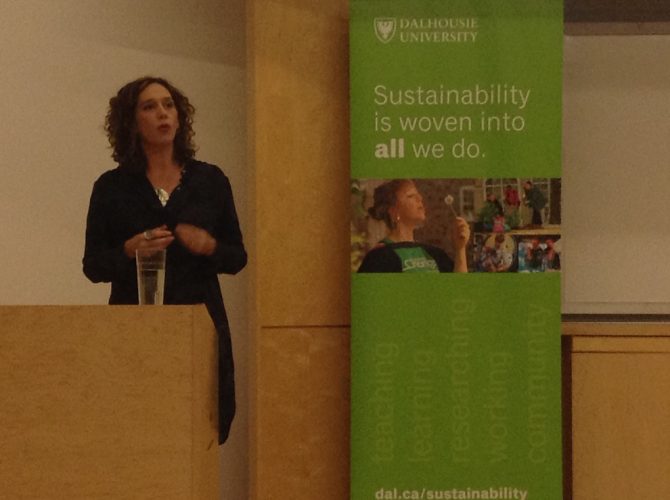ENVIRONMENT
Fresh hope seen as Canada tackles climate change
'We've seen more exciting developments in the last year than the last 10'

caption
Tzeporah Berman comes to Dal to give a talk on climate change and sustainability in Canada
caption
Tzeporah Berman gave a talk on climate change and sustainability at Dalhousie University.A new carbon tax is putting Canada back on the map when it comes to dealing with climate change, says environmental activist Tzeporah Berman.
“We are moving in the right direction,” Berman, an adjunct professor in the environmental studies department at York University, said Thursday at Dalhousie University..
“I feel really hopeful about Canada … our new prime minister has committed to a new national carbon price, which I think is critical in reducing pollution and creating the technological incentives to get more clean technology and renewables in the country.”
Berman gave a lecture at Dalhousie University entitled, “This Crazy Time: Living Our Environmental Change,” which is also the title of her recent book.
A national carbon tax, which will be implemented in 2018, will start at $10 per tonne of carbon diozide emitted and will increase to $50 per tonne by 2022. This is low compared to countries such as Norway, which implemented a tax in 1991 at $21 per tonne and in 2013 raised it to $70 per tonne.
A carbon tax is a tax on greenhouse gas emissions produced through the burning of fuels such as coal and natural gas. Each tonne of emitted gas is priced and, through this initiative, people should move away from using greenhouse gases and instead look to clean alternatives such as wind energy.
Individuals, as well as businesses, will be charged the tax. Provincial governments get to keep the tax revenue and the federal government will return the money from the federally imposed carbon tax to the province that was taxed.
“We’ve seen more exciting developments in the last year than the last 10,” says Berman.
In recent years, Canada hasn’t been active in global climate change initiatives because the Harper administration backed out of the Kyoto protocol, an international treaty implemented in 2005. As part of the protocol, participating countries agreed to reduce greenhouse gases.
The Harper government also implemented major pipeline projects that transported crude oil or natural gas liquids from producing fields, mostly in Alberta, to refineries across Canada and the United States.
In 2012, Canada accounted for 1.6 per cent of global greenhouse gas emissions. The European Union produced 9.8 per cent in the same year and the United States produced 13.9 per cent.
Even though Canada’s emissions seem low, the country is still one of the top 10 biggest producers of greenhouse gas in the world and third in terms of emissions per capita.
Isaac Greenberg, an economics and sustainability student at Dalhousie, attended Berman’s lecture. He says the carbon tax could be something that will move Canada forward in dealing with climate change issues.
With new initiatives, Prime Minister Justin Trudeau has sparked global interest in Canada and its climate change efforts.
“People internationally are really excited about the leadership that is happening in Canada now, especially with carbon pricing,” says Berman in an interview.
Even though Berman was hopeful in her speech about Canada and climate change, she also believes there is room for improvement.
A move towards a zero-emissions vehicle mandate, a model that California implemented in 2012, is something Canada should look to, says Berman.
The California regulation requires that 15 per cent of new vehicles sales in 2025 be zero-emission vehicles or battery electric vehicles, plug-in hybrid electric vehicles and fuel cell vehicles.
“It is possible to make the changes we need to make, to make a future that is not only healthy and safe, but exciting,” says Berman.

